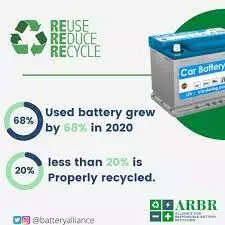- Home
- /
- More
- /
- Science & Technology
- /
- Group blames telcos...
Group blames telcos for non-compliance with used battery disposal

The Alliance for Responsible Battery Recycling (ARBR) has said that non-compliance with guidelines for used battery disposal by telecom operators and endusers constituted a serious environmental health hazard.
Mr Terseer Ugbor, Managing Director of ARBR, in a statement, urged telecom operators in Nigeria to comply with the Extended Producer Responsibility (EPR) guidelines for battery disposal.
The statement signed by ARBR Spokesperson, Ada Achanya, also urged the telecom operators to desist from exposing the environment to lead and strong acids from waste batteries to eliminate the dangers posed on the environment and human health.
"Non-compliance with the Extended Producer Responsibility (EPR) guidelines for battery disposal by telecom operators and endusers constitutes a serious health hazard and is of great concern to ARBR.
"Proper battery recycling is important to environmental and human health equally, and non-compliance with EPR creates a weak link leading to poor environmental management of Lead Acid and Lithium-Ion Batteries.
"Improper battery disposal contributes to water and air pollution, and when used batteries are handled by unqualified organizations, they contaminate ground and surface water and this has adverse effects on human health," the statement said.
Supreme reports that Extended Producer Responsibility (EPR) is a policy approach under which producers are given a significant responsibility – financial and/or physical – for the treatment or disposal of post-consumer products.
Supreme also reports that the Federal Ministry of Environment and the National Environmental Standards And Regulations Enforcement Agency (NESREA) recently passed the National Policy on Waste Battery Management and the National Environmental (Battery Control) Regulations.
ARBR is the Producer Responsibility Organization (PRO) saddled with the responsibility of minimising the environmental impact of batteries throughout the entire value chain including end-of-life management.
The statement further noted that some telecom service providers in Nigeria had declined compliance with the EPR guidelines.
It explained that the companies had refused to provide data on how its used batteries were being disposed and also declined to pay recycling fees on the disposal of hazardous waste batteries in the country.




